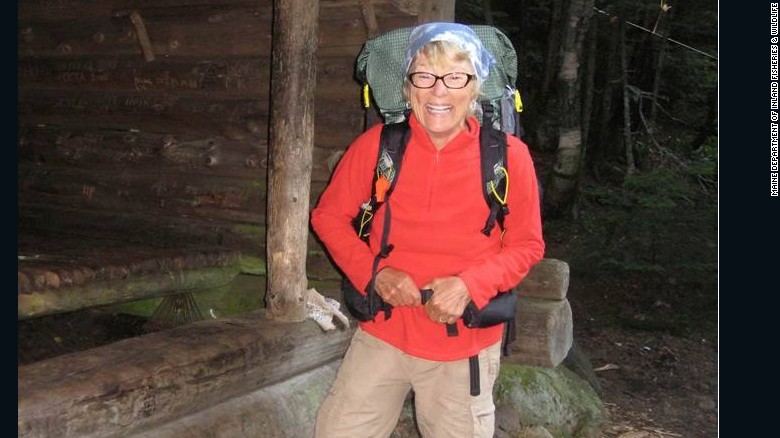
Geraldine Largay knew she was so very lost that the chances of her making it out of the thick Maine woods were gone.
She had been writing in her journal every day and one of her final entries showed she was resigned to her fate.
“When you find my body please call my husband George and my daughter Kerry. It will be the greatest kindness for them to know that I am dead and where you found me — no matter how many years from now. Please find it in your heart to mail the contents of this bag to one of them.”
It was August 6, 2013, about 15 days after she left the Appalachian Trail to use the bathroom.
Her body was found more than two years later, in a sleeping bag inside a zipped up tent.
Investigators this week released documents and photos related to the case. Texts and journal entries reveal Largay, 66, was alive for almost a month after she went missing.
Largay tried on July 22 to text her husband, who was meeting her at certain points along the almost 2,200-mile long trail, to get help from the Appalachian Mountain Club.
“In somm trouble. Got off trail to go to br. Now lost. Can u call AMC to c if a trail maintainer can help me. Somewhere north of woods road. Xox,” she wrote.
But the text didn’t go through. She walked west and kept trying to send the message. Ten more attempts, the last one at 12:25 p.m.
She tried to send a blank message two hours later. It didn’t go through.
She tried another message the next day, writing, “Lost since yesterday. Off trail 3 or 4 miles. Call police for what to do pls. Xox.” It also failed and she tried one more time to no avail.
By this time, Largay had set up her tent nearly 2 miles from the trail. She had some food, water and her camping supplies. And a journal that she wrote in each day.
One of the Maine wardens who compiled the evidence wrote that Largay’s writings were personal letters to her family.
There were entries through August 10 then nothing until the 18th. It was the last entry, 27 days after she got lost.
A forester on contract with the U.S. Navy found her campsite on October 11, 2015.
Two-year mystery
The Brentwood, Tennessee, resident, whose trail name was “Inchworm” due to her slow pace, started her journey in April 2013 at Harpers Ferry, West Virginia.
She was last seen on July 22 where she talked with two women at a lean-to, a sheltered stopping point. She planned to hike 8.4 miles north that day and then continue the next day to a point where the trail crossed a road. Her husband was to meet her there, but she never showed.
Hundreds of people and several dogs searched for her. There were few clues; she was last seen by two hikers, and her cell phone pinged a tower the afternoon she got lost.
Authorities said she died from starvation and exposure.
According to the more than 1,500 pages of documents, Largay was in good health and was an experienced hiker. She had traveled with a good friend, Jane Lee, until June 30, when Lee had to go home for a family emergency.
Lee told investigators that she was concerned about Largay hiking alone. Largay had a poor sense of direction and several times had taken a wrong turn. Once, Lee, who was a faster hiker and would sometimes go ahead then wait for her companion, said she had to double back and find Largay. The elder hiker had been walking the wrong direction until someone helped her get oriented.
One investigator wrote in 2013 that Lee told him Largay was in over her head trying to complete the rest of the trek solo.
CNN attempted Thursday to call a representative for the Largay family but was unsuccessful.
More phone traffic
The text of July 23 wasn’t the last Largay tried to send. There were also messages on the afternoon of July 30. And two texts were deleted on August 6, the same date of her hopeless journal entry.
It was unclear from the report whether Largay ever tried to call anyone herself.
Her husband told wardens that Gerry Largay used her cell phone sparingly, depending on the circumstances.
As reported by CNN
